Or a Theology of the Iguassu Falls based on the Mbya Guarani's Beautiful Words and other direct sources
By Jackson Lima, Foz do Iguaçu (Iguassu Falls), Argentina-Brazil
One of the most important events in the universe, for the Mbya Guarani, has been the creation of the “word”. Words are beings. In fact, the sacred variety of the Mbya Guarani language used in rituals, worship and philosophical questioning of life, uses the word “ Ñẽ’ẽ ” both for “word” and for “soul”. It is from this use that we get the concept of “word-soul”. And that is what we all are: word-souls. A name is not just a name. A name given to a Guarani child, by a name giver, is not just a name. It is “that which will hold upstanding the flow of his saying”. It is an inseparable part of his / her being-saying. A lie, a false promise or an effort to persuade someone is deffinitely something impossible to conceive and accept in the Guarani world. The Brazilian Guarani Shaman and Lecturer, Kaka Werá Jecupê wrote:
“(...) In the meantime, the space between idea and attitude have generated human misery. The Word runs through human government without spirit, without fufillment of what is said. Since word and spirit are worlds apart. The voice comes out dead. Nonetheless under heavy makeup in order to give an impression of life. The word signs peace treaties while the hand waives to war. Religion is deaf, because the spirit is dead”
In the Mbya Guarani Genesis known as the Ayvy Rapyta, Ñamandu the Supreme Spirit, the Creator of the Universe, appears in the primeval darkness with a firm intention to create. After creating his own body, the body through which he would manifest himself, Ñamandu created three very important things. He created the foundation of Human Speech. He created a little portion of Love. And he created a Sacred Hymn. Speech, Love and a Hymn. These things Ñamandu created. And soon after creation he realized that he needed to share those three things.
In order to illustrate the importance of words not only for the Guarani Indians but also for many other Amerindian and worlwide cultures, let us take as an example the Myth of Creation of the Huitotos of the Sacred Amazon forest. Says the Dream-Story:
“In the beginning, there was nothing. No time, nor space. No desert, no Ocean. No eagle, or forest, or mountain. Darkness was empty, silent and still. Then a word navigated through silence. It was the word “Father”. A being emerged from the word “Father” and became Father Nai-mu-ena.
Nai-mu-ena breathed. He thought words. He slept. Once, the scintillating shadow of something snaked through the darkness of his dreams, as if in another sudden dream inside the dream he was dreaming. He tried to catch the shadow with his mind and he caught it.
But the scintillating shadow that had been gushed out of the darkness of his dream could not be held down or attatched to anything. He could not keep it down with a rock, or prop it up with a piece of wood, because nothing existed yet. He had no box or a cavern where he could keep it. He was afraid that the shadow might fade back to nothingness.
Then he drew out of his thoughts, as if it were a line of raw cotton, the thread of an idea. He extracted the word “Earth” out of his thought and pressed it on the scintillating shadow. The scintillating shadow he dreamed about became the first soil, the ground of the Earth. He had dreamed that to reality. The Earth had started”.
In the world of today, a world of fast communication, travels, mass media, mass noise, advertising, government, public relations, persuasion and a several billion-dolar industry to keep us wanting more and more of anything, words have lost their power. Not power of persuasion but power creation, specially the power of creating a better world. The Guarani wisemen say that it is necessary to rescue the words – because we are words. If words are lost, we are lost too.
Remember the second most wonderful thing that Ñamandu created: a little portion of love. In the original Mby’a sacred language, a little portion of love (mborayu peteĩ i), sounds more like “a little bitty love”. The fact that “love” comes right after the “word” among the creation of Ñamandu, only increases the complexity of the situation. If words are not just words, love is not just a word that people can use on some special occasions. Thanks to moden day aggressive mass media and advertisment we hear things like “I love my car” and “my kids love popcorn” or “my stomach loves peptobismol”.
For the Mbyá Guarani or general Guarani world or cosmic vision, love is a kind of a fine, subtle, cosmic energy that is envolved with creation. And it is an act of great responsibilty when we say “I love you” to someone. These declaration can not be just said or even felt. Maybe we have to rethink the meaning of the word “felt”. The energy of love has to be vibrated and not only felt or thought about. In the same way that the Hindus have developped the Ayurvedic medicine and healing practices, and as the Chinese have organized acupuncture and the Japanese discovered Reiki, Shiatsu and all other healing systems, the Guarani Indians who inhabit the Amazon Forest and nearby areas have been practicing, for thousands of years, a healing practice that has been known to the world under the name of “Ama Deus Shamanic Healing”. Ama Deus is a non-grammatical Portuguese way (or a jungle Portuguese Way) to say “Amor de Deus” or Love of God.
This is a kind of healing practice that belongs to those systems of energy healing mainly in the family of Reiki who use the cosmic and life energy that is freely and abundantly available to all. In the Reiki-based family of hands-on energy healing or balancing, practitoners, in some levels, will use special symbols that have been handed down through thousands of years. The Guaranis do the same. The symbols in the Ama Deus (Love of God) Shamanic Healing use the energy of love as both a means of transportation and as road to take the healing to those who need. Try to feel love as not just a word. It will be easier to understand Jesus Christ, the prophet of love, when he told people to love. Love yourselves. Love your neighbors. Love your enemies. How can you love your enemy. It is difficult or even impossible if love is just a word. But it is easier if your love is a vibration – the same vibration found in Nature as seasons evolve into seasons, children play, couples make love, the Earth rotates undisturbingly, as flowers bloom, as life whispers love at important moments – when you are open to see / hear / listen.
The hymn and the ability to sing, celebrate, tell stories through songs is also a very human privilege. Maybe birds do the same. For the Ama Deus Shamanic Healing Guarani tradition a bird called Uirapuru is God’s Messenger and it possibly enjoys its on song. The Uirapuru’s song is so beautiful that, it is said, all the other birds in the forest stop to hear it. The Uirapuru is called musician wren in English and belong to the troglodit family. In the area of he Sacred Iguassu Falls – Source of the Creative Mists, the sacred bird is the hummingbird.
I have told somewhere in this book that Iguassu Falls – the Source of the Creative Mist is a sacred place because it is a place where we can remember. Remember what? Remember the importance of words. Remember love. Rememebr the Hymn of Life. But there are also a very important to remember. Besides this word consciousness the native peoples of the Iguassu Falls’ area are also very conscious of another very important fact. It has to do the fact thar we humans are the only upright walking animals. The fact of being upright. Walking upright is a constant reminder of the period when we decided to rise, to lift ourselves up, from walking on our fours to adopting the strange but very important upright walking position.
In the Mbya Guarani texts, humans are reffered to as those “risen” in the sense of those who have risen themselves up to the standing position. Scientists in the Western world say that the hands that we liberated as we rose up, are responsible for the progress of our brains and the progress of our whole complex humanity. The Mbya Guarani have never stopped thinking about this miracle. About this evolutionary leap forward (and upward, too).
The Mbya texts, compiled from the oral traditions, brings some messages that should be heeded. In one of the verses Ñamandu exhorts people: Ne ma’endua’áke che ree ne ãmy. This phrase means: Remember me in your heart. But in reality it does not say remember me in your heart. The word heart “py’á” is no where to be seen in the sentence. Instead we see the “ãmy”, at the end of the phrase. With this final thought I will end this chapter.
The word “ãmy” is a very complex word-concept that might surprise users of European languages or Asian languages who are part of the so called civilized world and are thought to be complex. The word “ã” is the root of the verb to lift oneself up. To say “I lift myself up” we just say “a’ã”.
When Ñamandu said “Remember me in your “ãmy” – He, the supreme being, is asking us to remember Him in “our quality of being “risen” up. Ñamandu’s invitation is that you remember him in the counsciousness of your human upright, standing condition. As upper and upright standing animals we should never lose awareness of our divinity.
This is finally one more good remenbrance we all are invited to have when we visit the Source of the Creative Mist – popularly known as Iguassu Falls – a Sacred Place. The Awareness of His Divinity that Ñamandu infused our first farthers-mothers with, continues to be part of all of us. It was part of His creation. This is a universal truth that we seem to have forgotten. We are all divine consciousness. The divine consciousness is infused in us. As the hindus say, we are sparks or divine flames in the ccean of universal energy.
After having received the infusion of His divine consciousness, Ñamandu gave to each of the new fathers, just created, specific responsibilities. Which are the activities and responsibilities of these parents of humanity according to the Mbyá Guarani Sacred Hymn?
Saturday, December 16, 2006
Subscribe to:
Post Comments (Atom)
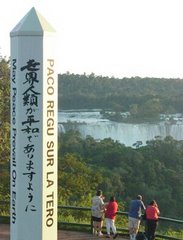



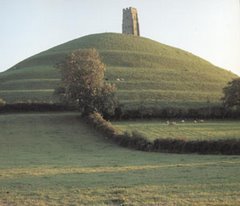
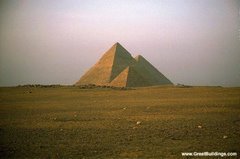


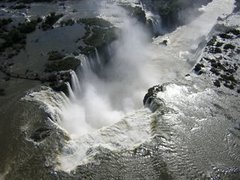




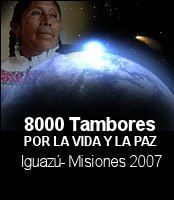
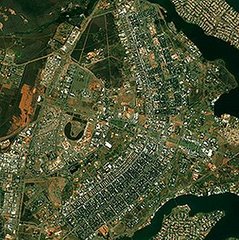


No comments:
Post a Comment